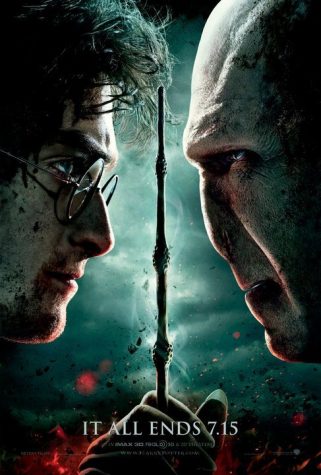Should Books Be Adapted Into Films?
April 6, 2017
 Films have been adapted from books since the beginning of the film industry. Reading was the main form of entertainment before film and television, so film adaptation was a natural progression for this very new industry. However, adapting written stories into movies lately is becoming increasingly common compared to years past. Some people look down on this practice — they believe stories from books are meant for the individual’s creative mind, not for an actor to make their own character on screen, while others welcome the idea of a different interpretation of the same material. No matter the opinion, some adaptations to the screen fare better than others do. The question is, what story elements can be adapted into an engaging film?
Films have been adapted from books since the beginning of the film industry. Reading was the main form of entertainment before film and television, so film adaptation was a natural progression for this very new industry. However, adapting written stories into movies lately is becoming increasingly common compared to years past. Some people look down on this practice — they believe stories from books are meant for the individual’s creative mind, not for an actor to make their own character on screen, while others welcome the idea of a different interpretation of the same material. No matter the opinion, some adaptations to the screen fare better than others do. The question is, what story elements can be adapted into an engaging film?
Some of the most popular adaptations come from young adult novels such as “Twilight,” “The Hunger Games” and “Harry Potter.” There are also series targeted toward older demographics, like “Girl with the Dragon Tattoo” and “Game of Thrones.” These films and TV series’ immediate popularity likely stems from the close relationship the readers have with the characters. “Harry Potter,” for example, was a series in which readers felt enveloped by the story and the world that J.K. Rowling created. Fans were — and still are, judging by the success of “Fantastic Beasts and Where to Find Them” — obsessed with the story, wanting as much of it as they can get.
However, this is also a series in which many fans still feel got lost in translation. The books were so detailed and complex that there was no way a screenwriter could capture them all, even if the last book was broken into two films. So much of the stories remains only in the books and the imaginative minds of their readers.
Characters are often adapted in movies to better fit the film and stray away in their descriptions from books. In “Harry Potter,” there are frequent little plot changes throughout the movies that put fans on edge. When — spoiler — Dumbledore is murdered in the “The Half Blood Prince” Harry watches without doing anything. In the book, he doesn’t act, because he is Stupefied. That detail was left out in the movie, which confused fans of the books and first-time watchers alike. Still, although there were both minor and serious changes in “Harry Potter,” the franchise as a whole is tremendously successful.
On the other hand, there are other series that have been recognized more for their interpretations as movies rather than books. “James Bond” and “Jason Bourne,” both action series, were never able to fully capture their stories’ plots as books. The films brought them to life.
Many people are completely unaware that some of the most famous Hollywood movies have been adapted from books. Classics like “Psycho,” “Dr. Strangelove,” “Breakfast at Tiffany’s” and “The Graduate” were all originally books, but the films became popular and achieved critical acclaim, going on to inspire generations of moviemakers. It is difficult to think of “Psycho” as a book when Alfred Hitchcock’s film was such a significant part of Hollywood history — its radical challenging of censorship and shocking violence stunned audiences.
Some approaches to films are also far more interesting than the novels were. “Fantastic Mr. Fox,” one of Wes Anderson’s most creative and quirky films, took a completely different approach to the story by using stop-motion animation. The book, classic as it may be, simply does not have the ability to be as engaging in its literary format.
More recently, there have been many adaptations of less popular books. The highly-acclaimed 2015 film “Room” was based off director Emma Donoghue’s novel of the same name. Although the basic story was the same, filmmakers altered the plot in noticeable ways. They erased characters and extraneous plot lines from the novel to keep the attention on the mother and son protagonists. The extra focus strengthened the apparent bond between the two.
What’s more, “Room”’s soundtrack brought it to a level that a silent book never could have. It’s worth noting that this was also a case where the book did not have the same fanatic following that its adaptation acquired. “Room” was easily a case in which adapting it to film was one of the smartest choices the author could have made.
The film and entertainment industry is a big part of our society and culture, and it’s not going anywhere. Adapting written stories has brought us many incredible films. Movies like “The Godfather,” “Fight Club,” “Blade Runner,” “Apocalypse Now,” “Silver Linings Playbook,” “Moonlight” and “Hidden Figures” all came first from literature. Although pieces of the stories can be lost in the adapting process, nothing beats a great story on the big screen.
A version of this article appeared in the Thursday, April 6 print edition.
Email Sophie Bennett at [email protected].

